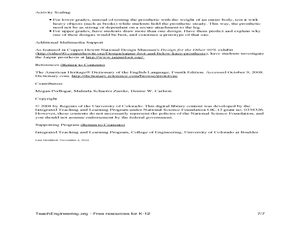Curated OER
When Is It O.K. to Replace Human Limbs With Technology?
Today's blog topic is robotic limb replacement for amputees. Upper graders read the related article and argument, then compose a blog response that addresses the questions provided. This is a great way to get kids thinking about ethics,...
Curated OER
Prosthetic Party
Students examine human anatomy by creating a prosthetic limb. In this medical engineering lesson, students view numerous images of prosthetics used in science today and define several medical terms associated with prosthetics....
Curated OER
Prosthetic Limbs
Pupils create a simple model of the muscles in hand opening and closing the it. They make the model move a block in a specified direction.
Curated OER
How to Make an Artificial Organ
Students design bionic organs or limbs. In this medical technology lesson, students view a video about artificial organs and prosthetic limbs. They research the medical technology behind these advances and work to design a organ or limb...
Curated OER
How To Make an Artificial Organ
Young scholars examine the advances made in technology with regard to prosthetics and replacement organs and limbs. They describe the anatomy and functions of different organs and create their own artificial organ. They defend and...
DiscoverE
A Leg to Stand On
Give your learners a leg up in their study of engineering. Groups design and create a prothestic for a leg. They test out their designs for strength, stability, durability, and comfort.
Teach Engineering
Connect the Dots: Isometric Drawing and Coded Plans
Individuals discover how to draw cubes on triangle-dot paper. They use cubes to build structures and draw corresponding isometric drawings on dot paper in the second lesson of the series of five. The activity also introduces the concept...
TeachEngineering
Teach Engineering: An Arm and a Leg
Students will design and build a prototype of an artificial limb using a simple syringe system as an introduction to bioengineering. Students will determine which substance water (liquid) or air (gas) will make the appendage more efficient.









